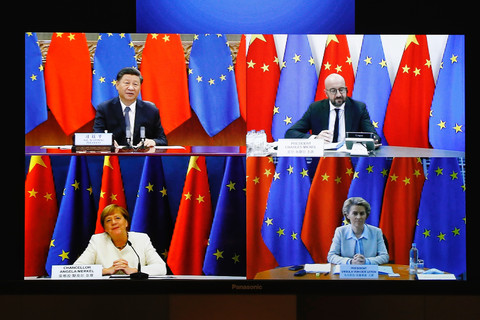[ad_1]

The EU and China are edging closer to a long-sought investment deal which would give European firms better access and protection in the Chinese market, but is bound to irk the new US administration.
The EU Commission, on Monday (28 December), briefed the 27 EU ambassadors in Brussels on the latest progress in talks, which have been going on since 2014.
And none of the envoys raised any objections to going ahead, which meant an announcement on the deal could come as early as this week.
Talks had been stuck for years, with Beijing failing to deliver on promises on lifting restrictions on EU investments in China, but recent tensions between the US administration of outgoing president Donald Trump and Beijing may have helped change the Chinese position.
For the EU, which has described China as its systemic rival, the agreement would remove barriers to foreign investments in China in certain industries, such as real estate, manufacturing, construction, and financial services.
The deal would also tackle Chinese policies which the EU says are distorting the market, such as industrial subsidies, state control of enterprises, and forced technology transfers from European firms that establish facilities in China.
For China, which has sought more access to the energy sector in Europe, the deal was expected to offer some investment possibilities in renewable energies on a reciprocal basis.
It could bolster Beijing’s claims to be a geopolitical force supporting multilateralism and mitigate the effect of the EU’s screening of Chinese investments.
The investment deal could also strengthen China’s call to starting negotiations on a free-trade agreement, for which the EU has said that an investment pact was a prerequisite.
The progress came despite troubled EU-China relations this year.
A recent Chinese law curbing Hong Kong’s autonomy sparked criticism in Europe, but member states struggled to come up with a unified response, while finally restricting the export of surveillance technology.
The EU also called out China for spreading disinformation in Europe during the coronavirus pandemic, saying it was partly behind false campaigns undermining European democracies and responses to the crisis.
An investment agreement, could, however, stir criticism by rights groups over China’s use of Uighur Muslims detained in large numbers in the Xinjiang province and used as forced labour.
The key sticking point in the last stretch of the talks had been the EU’s call on China to sign up to international rules on forced labour, which Beijing eventually agreed to.
An investment deal, which would legally be finalised next year, still needed to be ratified by EU governments and the European Parliament.
UK irritated
Meanwhile, the EU-China agreement is expected to cause irritation for the incoming administration of president-elect Joe Biden in Washington.
Jake Sullivan, who will serve as Biden’s national security adviser, wrote on Twitter last week that the new US administration would “welcome early consultations with our European partners on our common concerns about China’s economic practices”.
The EU earlier urged the US to work together to meet the “strategic challenge” posed by China.
EU officials have been arguing, however, that the investment deal will only put the EU on par with the US, which has already secured the same benefits in its so-called Phase 1 trade pact with China.
Earlier, Poland’s foreign minister Zbigniew Rau cautioned EU partners not to rush into a deal without US consultation.
“Europe should seek a fair, mutually beneficial Comprehensive Agreement on Investment with China. We need more consultations and transparency bringing our transatlantic allies on board. A good, balanced deal is better than a premature one,” he tweeted last week.
[ad_2]
Source link